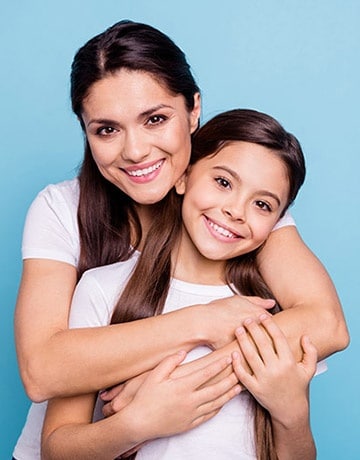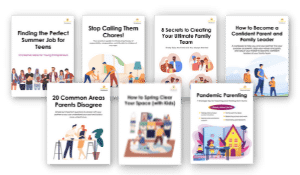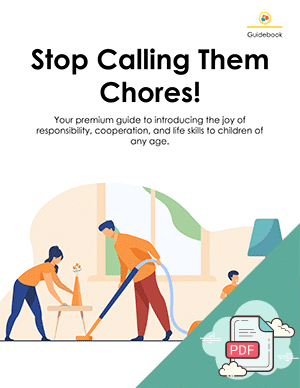- Home
- »
- Family Bonding Challenge
- »
- No More Chores. Introduce...
No More Chores. Introduce New Responsibilities for Kids.

Age: 1+
Time: 20 minutes
Materials: none
Focus: develop life skills
Rethinking Chores for Kids
Responsibility is a life skill. It’s one of those things that makes independence realistic for our children.
This challenge and our supporting guide aren’t just about coming up with more chores but rather responsibilities for kids.
They’re about helping you, the family leader, reach a place with your children where they understand how their contribution to maintaining a healthy and happy home is vital to everyone’s happiness. Responsibilities gives a sense of ownership to the work and allows your child to feel pride in a job well done.
As a result, there are a couple of goals we’re reaching for in this week’s challenge. One of them is simply to find a new way to have our children become responsible for something that supports the whole family.
Another goal is to remind ourselves just how skillful and thoughtful even very young children can be if given the opportunity.
You’re also doing the following:
- teaching life skills
- potentially sharing stories about your responsibilities growing up
- supporting their sense of pride and accomplishment in developing a new skill
- explicitly communicating your values around whatever task is chosen
- strengthening your bond by creating memories over an activity
- being proactive in your parenting regarding rules of the home and the scope of things that need to get done
- fostering a positive attitude around helping the family stay tidy and run smoothly rather than using “chores” as a form of punishment
If you have young children, give them a few options to choose from. If you have older children, let them come up with the idea independently. As long as their choice is something they can eventually do safely and independently, it’s a win-win!
How to Introduce New Responsibilities for Kids
Help your child pick one new thing they want to be responsible for around the house. Let your child know you have your own responsibilities to take care of and share what they are.
Be aware that your children may complain about a new responsibility. That’s okay. Let them know you don’t always want to do yours either, but that when the family shares the responsibilities, it makes less work for everyone. Then the family can enjoy a clean house together.
Don’t associate these new responsibilities with allowance as taking care of the home should be a team effort. If your children want to do something for money, create a list of extra things that can be done once their new responsibility has been completed.
Spend the next few days/weeks/months (depending on your child’s age) training them how to do the task properly so they feel confident they can do it successfully on their own (or with minimal supervision).
Opportunities range from simply putting dirty clothes in the hamper (age 2+) to putting away silverware from the dishwasher (age 3+) to anything you feel appropriate! The time you spend together learning should be fun and engaging.
Children want to feel needed and part of the family team.
When your children are ready to do their tasks on their own, designate a time where everyone in the family completes their task at the same time. Putting on some music when everyone is doing their job will make the time more enjoyable.
If you can’t all complete your tasks together, make sure you complete yours while the kids are home and can see you doing them. It’s too easy for kids to forget how hard parents work on keeping the house in order when all they see is the end result.
Bonus Family Benefits to Teaching Responsibility
It’s important to remember that learning responsibility takes time and a lot of effort from both parent and child. The process will evolve over time as children mature and gain more awareness and capability.
Overall, there are a number of benefits to framing a child’s family contribution as learning and engaging in a new responsibility for your kids rather than assigning more chores. Some of those include the opportunity to
- share family values;
- spend less time and money looking for or replacing items because they weren’t put away or cared for;
- discouraging a sense of entitlement;
- having everyone in the family feel more satisfaction with the possessions already owned.
Need Ideas?
Download our premium guide below for FREE! Inside you’ll find suggestions and checklists for age-appropriate tasks from 2–18 years old.
Join the Community!

Get Excited About Your Future
Delight your inbox with monthly lessons carefully chosen to help you grow as a proactive parent who's always looking to learn more about raising a strong family team.

Monthly Live Engagement
Join our monthly live chats to discuss each month's topic in-depth and get all your questions answered.

Worksheets and Guidebooks to Grow Better Together
Members receive many of our guides for free and access to deep discounts to the entire collection to continue growth and development together.
Guidebook
Stop Calling Them Chores!
A premium guide to introducing the joy of responsibility, cooperation, and life skills for parents with children of any age.
Somer Loomis
Somer is the Chief Content Officer at Raising Families, living in Southern California with her husband, nine-year-old son, and four-year-old daughter. She spent 10 years in the architecture field as a designer and medical planner, and now applies her love of integrative thinking and big-picture planning to her family and career.
In her free time, she loves cooking new recipes her children will never eat and saving craft projects on Pinterest she will likely never do. Nevertheless, she persists. Read full bio >>
Get your free Family Bonding Challenge Calendar sent directly to your inbox!



